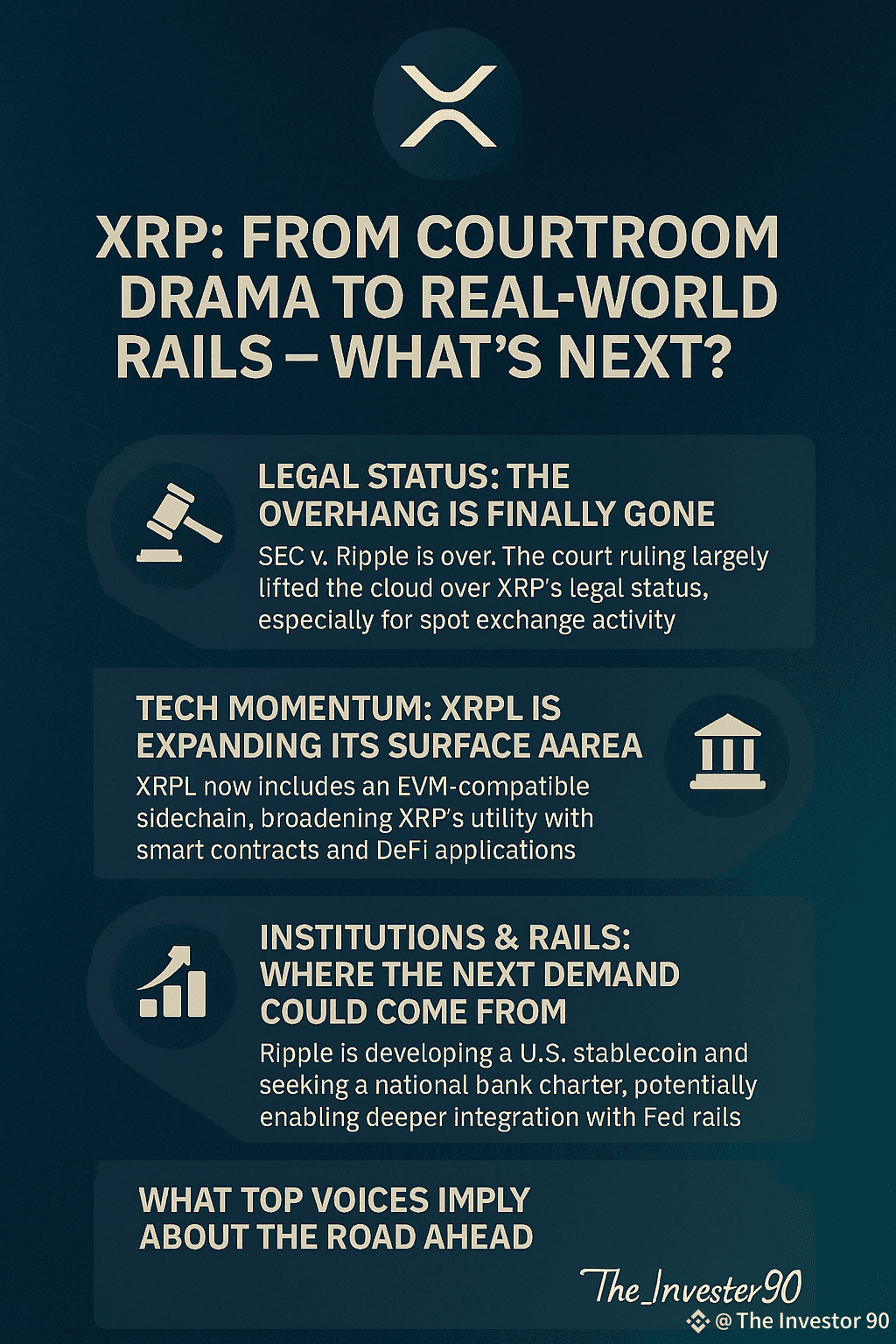$XRP just stepped out of a five-year legal tunnel into sunlight—and builders didn’t wait. The combo of legal clarity + new tech + potential banking ambitions is the most bullish setup this asset has seen in years.
⚖️ Legal status: the overhang is finally gone
SEC v. Ripple is over. Judge Analisa Torres’ 2023 split ruling stands: programmatic XRP sales on exchanges ≠ securities; institutional sales did violate securities law. Final outcome: Ripple pays $125M and abides by an injunction on institutional sales. No more appeals.
Markets noticed: news of the case ending coincided with a broad crypto pop.
Takeaway: The “is XRP a security?” cloud that capped U.S. participation is largely lifted for spot exchange activity.
🛠️ Tech momentum: XRPL is expanding its surface area
XRPL EVM Sidechain is live (June 30, 2025). Ethereum-compatible smart contracts + a native bridge = DeFi and dApps in XRP land, with Axelar connectivity.
AMM on XRPL (XLS-30) is now part of the protocol—native liquidity pools without leaving the ledger.
Why it matters: Liquidity and devs follow utility. EVM compatibility and a native AMM turn XRP from “payments token only” into a broader platform bet.
🏦 Institutions & rails: where the next demand could come from
Stablecoin stack: Ripple’s USD stablecoin RLUSD has institutional custody ties (BNY) and Ripple is doubling down—acquiring Rail (stablecoin payments infra) to push settlement into real commerce.
Bank charter bid: Ripple has applied for a U.S. national bank charter—a swing at deeper integration with Fed rails and regulated balance-sheet services. Expect pushback, but the signal is huge.
Macro tailwind: Policy shifts expanding where Americans can hold crypto (e.g., 401(k) access) expand the potential buyer base over time.
🔭 What top voices imply about the road ahead
Legal experts’ read: Torres’ framework gives the industry a workable line: exchange trades ≠ securities, direct institutional deals often are. That clarity tends to unlock listings, liquidity, and enterprise pilots that were on pause.
Builder view: Ripple CTO David Schwartz highlights the EVM sidechain as the bridge bringing Ethereum-style apps into XRPL without compromising its payments core—code for “TVL and devs can finally show up.”
📈 Scenarios I’m watching (next 6–12 months)
Adoption flywheel (bull case): EVM sidechain TVL grows, AMM volumes deepen, RLUSD traction rises with new merchant/payment corridors; bank-charter progress + friendlier policy catalyze U.S. institutions. (Implication: XRP challenges prior ATH on growing on-chain demand rather than pure speculation.)
Base case: Post-litigation flows and product launches keep XRP in an up-and-to-the-right range, punctuated by partnership/news bursts. Watch the $3–$4 band as a sentiment barometer per recent market structure.
Risk case: Regulatory pushback on the bank charter, delays in stablecoin rules, or underwhelming EVM/AMM usage could stall the narrative.
🧭 How to think about XRP now (framework, not advice)
1. Policy clarity reduces headline risk and widens participation.
2. Platform expansion (EVM + AMM) = more things to do with XRP.
3. Settlement + stablecoins connect XRP’s payments story to real economy throughput.
4. Institutional plumbing (custody, banking links) is the bridge from narrative to sustained flows.
Bottom line: XRP’s next leg won’t be won in court—it’ll be won in daily usage: payments, liquidity, and apps that make XRP the cheapest, fastest settlement layer in the room.
This is Not financial advice. Do your own research.
